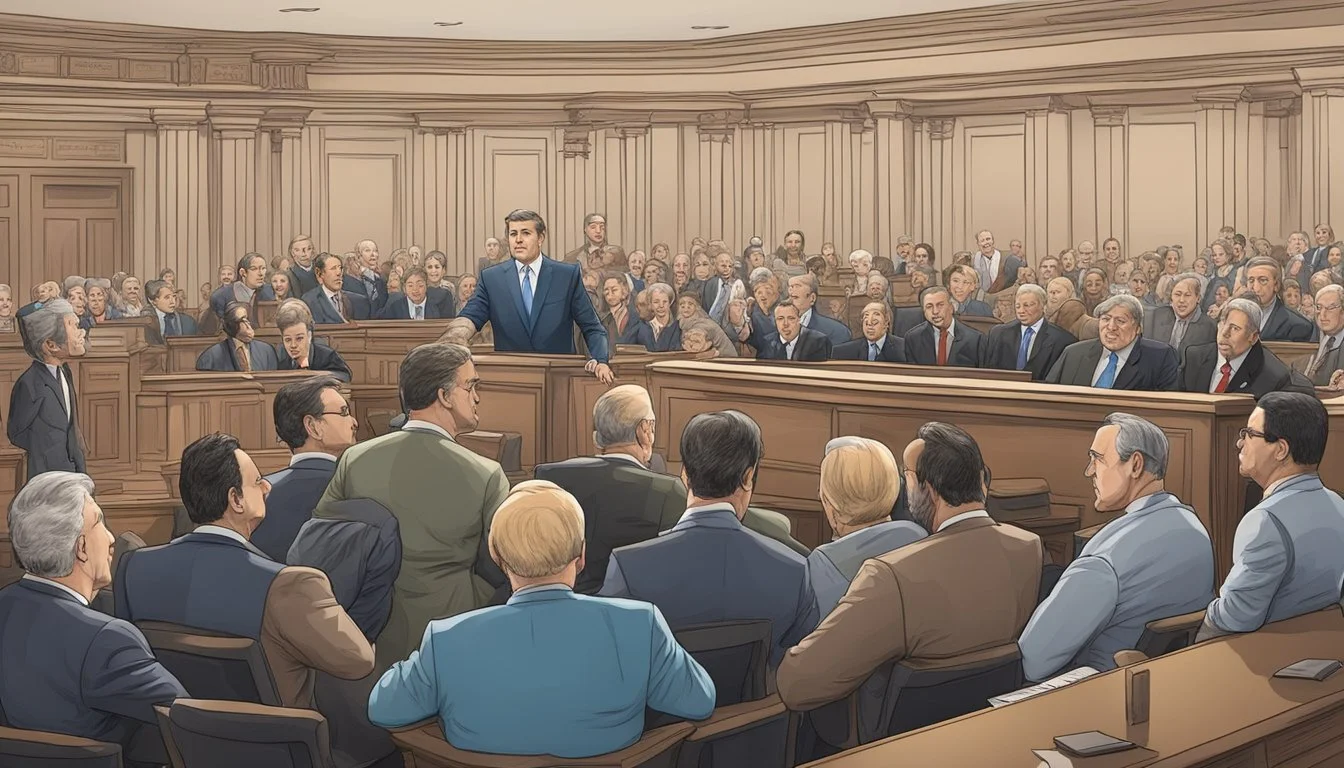Jake Tapper: From Reporting Scandals to Becoming a Political Lightning Rod
CNN Anchor's Controversial Journey
Jake Tapper has become a prominent figure in American political journalism. As CNN's chief Washington correspondent and anchor, he has covered numerous high-profile political events and scandals. Tapper's reputation for tough interviews and fact-checking has made him both respected and controversial in political circles.
His latest project, "United States of Scandal," sees Tapper examining six iconic political scandals from American history. The series features interviews with key figures involved in these controversies, offering viewers insight into the motivations and consequences behind major political downfalls.
Tapper's career trajectory has taken him from print journalism to television stardom. His rise to prominence has coincided with an increasingly polarized political landscape, where his attempts at balanced reporting have sometimes drawn criticism from both sides of the aisle. This combination of high-profile reporting and public scrutiny has positioned Tapper as a lightning rod in contemporary political discourse.
The Career of Jake Tapper
Jake Tapper's journey in journalism has been marked by his incisive reporting and influential role at CNN. His career trajectory showcases a blend of hard-hitting journalism and political commentary.
From Journalism to CNN Anchor
Jake Tapper began his career as a print journalist, writing for publications like The Washington City Paper and The New Republic. He gained recognition for his political reporting during the 2000 presidential campaign. In 2003, Tapper joined ABC News, where he served as Senior White House Correspondent and hosted the Sunday morning show "This Week."
Tapper joined CNN in 2013, becoming the network's chief Washington correspondent and anchor of "The Lead with Jake Tapper." His role expanded to include hosting "State of the Union" on Sunday mornings. Tapper's direct interviewing style and in-depth political analysis quickly made him a prominent figure in cable news.
Political Influence and Scandal Reporting
Tapper's reputation for tough questioning and fact-checking has made him a respected voice in political journalism. He has covered numerous high-profile scandals and political controversies throughout his career. His reporting on the Benghazi attack and his interviews with political figures have often generated headlines.
In 2024, Tapper hosted "United States of Scandal," a CNN series examining major political scandals of the past 25 years. The show featured interviews with key figures involved in these controversies, showcasing Tapper's ability to delve into complex political issues.
Tapper's work has earned him several awards, including Emmy Awards for his coverage of the 2020 presidential election. His influence extends beyond television, with active engagement on social media platforms and authorship of several books on American politics and history.
Notable Scandals in American Politics
American politics has been marked by numerous scandals that have shaped public perception and policy. These controversies span decades, revealing the complex interplay of power, ethics, and accountability in the nation's democratic system.
Pre-Trump Era Controversies
The Rod Blagojevich case stands out as a striking example of political corruption. The former Illinois governor was convicted of trying to sell Barack Obama's vacant Senate seat in 2008. His actions led to impeachment and a 14-year prison sentence.
John Edwards, once a rising star in the Democratic Party, faced a dramatic fall from grace. His extramarital affair and alleged misuse of campaign funds to cover it up derailed his 2008 presidential bid and ended his political career.
The Valerie Plame affair in 2003 exposed the dangers of mixing politics with national security. Plame's identity as a CIA officer was leaked, allegedly in retaliation for her husband's criticism of the Iraq War, sparking a federal investigation.
The Trump Era and Its Aftermath
Donald Trump's presidency was marked by numerous controversies. The Mueller investigation into Russian interference in the 2016 election dominated headlines for years, resulting in multiple indictments but no direct charges against Trump himself.
The January 6 Capitol attack in 2021 became a defining moment of Trump's post-presidency. The violent attempt to overturn the 2020 election results led to impeachment proceedings and ongoing investigations.
Hunter Biden's business dealings and alleged laptop contents have become a focal point for Trump supporters, leading to congressional inquiries and heated political debates.
Political Repercussions and Justice
Matt Gaetz, a Florida congressman, faced a DOJ investigation into alleged sex trafficking, highlighting the intersection of personal conduct and political power. The case remains ongoing, with potential implications for his political future.
George Santos's fabricated resume and campaign finance issues shocked the political world. His case raised questions about vetting processes and the integrity of electoral systems.
Eliot Spitzer's prostitution scandal in 2008 led to his resignation as New York governor, demonstrating how personal indiscretions can abruptly end promising political careers.
Exploring Political Lightning Rods
Political scandals have long captivated public attention and shaped the careers of public figures. These controversies often arise from complex interplays of power, ethics, and human fallibility.
Causes of Political Scandals
Sex scandals frequently rock the political landscape. High-profile cases have involved both Democrats and Republicans. Power and prominence can lead to inflated egos and risky behavior.
Financial impropriety is another common trigger. Misuse of campaign funds or illicit enrichment schemes have toppled many careers.
Spy scandals, though rarer, create significant upheaval. Leaks of classified information or unauthorized contacts with foreign agents can devastate reputations.
Some scandals stem from intoxication with power. Officials may believe they're above the law, leading to brazen wrongdoings.
Public Figures' Downfall
When scandals break, the fall from grace can be swift and severe. Media scrutiny intensifies, putting every aspect of a politician's life under the microscope.
Party affiliations often influence the aftermath. Democrats and Republicans may react differently to scandals within their ranks.
Public apologies are common, but their effectiveness varies. Some figures successfully rehabilitate their image, while others fade into obscurity.
Legal consequences frequently follow. Investigations, trials, and potential jail time can result from serious transgressions.
The impact extends beyond individuals. Scandals can shake public trust in institutions and spark calls for reform.
The Role of Media in Democracy
Media plays a crucial role in shaping public opinion and holding those in power accountable. It serves as a bridge between citizens and their government, providing information essential for informed decision-making in a democratic society.
CNN's Position and Responsibility
CNN, as a major news network, holds significant influence in American politics. The network's coverage of political events and scandals can sway public perception and impact policy discussions. CNN's commitment to fact-based reporting is crucial for maintaining public trust.
Jake Tapper's new series "United States of Scandal" exemplifies CNN's efforts to examine past political controversies. By exploring scandals from the early 21st century, the show aims to provide historical context and insights into the American political landscape.
CNN's responsibility extends beyond reporting current events. The network must balance breaking news with in-depth analysis to help viewers understand complex political issues.
Journalists as Watchdogs
Journalists serve as watchdogs in a democracy, investigating wrongdoing and exposing corruption. Their work is essential for maintaining transparency in government and holding officials accountable.
Reporters like Jake Tapper play a vital role in uncovering political scandals. Through investigative journalism, they bring important information to light that might otherwise remain hidden from the public.
The media's watchdog function faces challenges in the current political climate. Accusations of "fake news" and attempts to discredit journalists can undermine their ability to serve as effective checks on power.
Despite these obstacles, many journalists remain committed to their role as guardians of democracy. They continue to investigate, report, and inform the public, ensuring that citizens have the information they need to participate in the democratic process.
CNN Originals and Impactful Storytelling
Jake Tapper's involvement with CNN extends beyond daily news reporting into long-form storytelling that tackles complex political topics. His work exemplifies CNN's commitment to in-depth exploration of American political history and current events.
Documentaries and Series Showcasing Political Narratives
Jake Tapper hosts "United States of Scandal," a CNN Original series that examines notable political scandals throughout American history. The show, which premiered in February 2024, quickly gained attention for its detailed analysis of past controversies. CNN renewed the series for a second season, announced at the Warner Bros. Discovery upfront presentation in May 2024.
The success of "United States of Scandal" reflects CNN's broader strategy in developing impactful long-form content. Amy Entelis, executive vice president for talent and content development at CNN Worldwide, has championed such projects. Under her leadership, CNN Originals Group has produced numerous documentaries and series that delve into political narratives.
CNN Films and CNN Presents have become platforms for thought-provoking content that often explores political themes. These productions are available through various distribution channels, including CNN.com and cable operator platforms, expanding their reach beyond traditional television broadcasts.


